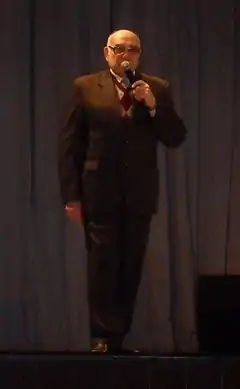Viktor Tsybulenko
Viktor Serhiyovych[2][1] Tsybulenko (Ukrainian: Віктор Сергійович Цибуленко, Russian: Виктор Серге́евич Цыбуленко, 13 July 1930 – 19 October 2013) was a Ukrainian javelin thrower who represented the Soviet Union.[3]
 Viktor Tsybulenko in 2012 | |||||||||||
| Personal information | |||||||||||
|---|---|---|---|---|---|---|---|---|---|---|---|
| Born | 13 July 1930[1] Vepryk,[1] Kyiv Oblast, Ukrainian SSR, Soviet Union | ||||||||||
| Died | October 19, 2013 (aged 83) Kyiv, Ukraine | ||||||||||
| Height | 1.88 m (6 ft 2 in) | ||||||||||
| Weight | 92 kg (203 lb) | ||||||||||
| Sport | |||||||||||
| Sport | Athletics | ||||||||||
| Event(s) | Javelin throw | ||||||||||
| Club | SKA, Kyiv | ||||||||||
| Achievements and titles | |||||||||||
| Personal best(s) | 84.64 m (1960) | ||||||||||
Medal record
| |||||||||||
He competed for the Soviet Union at the 1952, 1956 and 1960 Olympics and won a gold medal in 1960 and a bronze in 1956, while finishing fourth in 1952.[2] For these achievements he was awarded the Order of the Red Banner of Labour in 1960 and the Order of the Badge of Honor in 1957.
Tsybulenko was ranked within the world's top 10 javelin throwers in 1952–62, except for 1955; his best placement was second in 1962 and third in 1960. Nationally he won the Soviet title in 1952, 1955–57 and 1959.[2]
After finishing his athletics career Tsybulenko served in the Soviet Army, retiring in 1985 with a rank of colonel. He then returned to the javelin throw and won the 1994 World Masters Championships.[2]
Tsybulenko was born in village of Vepryk, Fastiv Raion in 1930.[1] In 1931 father of Viktor, Serhiy Tsybulenko, was "dekurkulized" (Dekulakization, a process of taking away personal property from peasants by the Soviet state) and in 1933 Tsybulenko family moved to Kyiv running away from further persecutions.[1] In Vepryk Tsybulenko family used to own 20 a (0.49 acres) of land and horses that died ithree months after being taken away to collective farm (kolkhoz).[1] On the son's question why Serhiy Tsybulenko did not foresee the situation and join the collective farm, he answered that after being labeled as "kurkul", he could not do that.[1] Viktor Tsybulenko testified that in 1933 a lot of people died from famine, but his grandma unlike most villagers had a root cellar in her house, which the Soviet prodotryads (food requisitioning detachment) were not able to reach.[1]
See also
References
- Maksym Rozenko. The 1960 champion of Summer Olympics in Rome Viktor Tsybulenko about the German occupation (Олімпійський чемпіон Рима-1960 Віктор Цибуленко про німецьку окупацію). Ukrayinska Pravda (Istorychna Pravda). 6 May 2020
- Viktor Tsybulenko. sports-reference.com
- "Сайт федерації легкої атлетики України". Uaf.org.ua.